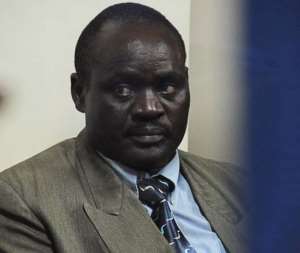
KIGALI (AFP) - The first genocide suspect to be transferred by the International Criminal Tribunal for Rwanda made his debut appearance in a domestic court on Thursday.
Jean Uwinkindi was told by prosecutor Ndibwami Rugamba that he faced charges for genocide and crime against humanity, a week after he was flown from the UN-backed tribunal in neighbouring Tanzania to the Rwandan capital.
"You are charged with the crime of genocide," Judge John Byakatonda told the suspect. "Are you ready to stand trial?"
"These are serious charges," Uwinkindi told the court. "I need time to review the dossier and find a lawyer. I need at least four months before I'll be ready."
Uwinkindi was pastor of the pentecostal church in Kanzenze, in the region around Kigali during the genocide. He is accused of leading a group of Hutu extremists on a hunt to murder Tutsi civilians, but denies all charges.
Up until June 2011, the ICTR had rejected all transfer requests submitted by Kigali arguing that the conditions were not in place in Rwanda for fair trials. The tribunal changed its mind after a series of reforms were implemented.
The transfer back to Rwanda is significant because Kigali has sent extradition requests to several western countries including France, Britain, the Netherlands, the US and Canada.
Canada in January extradited Leon Mugesera, an academic and former politician wanted by Kigali for an incendiary speech delivered at a political rally in 1992. Washington has already extradited two suspects.
The judge said he would give a decision Friday as to the amount of time Uwinkindi will be given to prepare for trial.
"He is requesting too much time," head of the Rwanda Prosecutor's Genocide Fugitive Tracking Unit, Jean Bosco Siboyintore, told AFP after the hearing.
"We want him to go to court and argue his case without undue delay. He is delaying his own case."
Two other case files of former officials sought by the ICTR have since been sent to Kigali: those of Fulgence Kayishema and Charles Sikubwabo. Both men are fugitives.
The transfer of cases to national jurisdictions is part of the ICTR's plan to wind up lower court cases by June and appeals by 2014.
Some 800,000 people, for the most part Tutsis, were killed in the 1994 Rwanda genocide. The ICTR was set up later that year to try the main perpetrators of the massacre.
While the masterminds have been tried at the ICTR, other perpetrators have been tried either in the Rwandan court system or before the grass roots tribunals known as gacacas.




 Tuesday’s downpour destroys ceiling of Circuit Court '8' in Accra
Tuesday’s downpour destroys ceiling of Circuit Court '8' in Accra
 SOEs shouldn't compromise on ethical standards, accountability – Akufo-Addo
SOEs shouldn't compromise on ethical standards, accountability – Akufo-Addo
 Father of 2-year-old boy attacked by dog appeals for financial support
Father of 2-year-old boy attacked by dog appeals for financial support
 Jubilee House National Security Operative allegedly swindles businessman over sa...
Jubilee House National Security Operative allegedly swindles businessman over sa...
 Nobody can order dumsor timetable except Energy Minister – Osafo-Maafo
Nobody can order dumsor timetable except Energy Minister – Osafo-Maafo
 Mahama wishes National Chief Imam as he clock 105 years today
Mahama wishes National Chief Imam as he clock 105 years today
 J.B.Danquah Adu’s murder trial: Case adjourned to April 29
J.B.Danquah Adu’s murder trial: Case adjourned to April 29
 High Court issues arrest warrant for former MASLOC Boss
High Court issues arrest warrant for former MASLOC Boss
 Align academic curriculum with industry needs — Stanbic Bank Ghana CEO advocates
Align academic curriculum with industry needs — Stanbic Bank Ghana CEO advocates
 Election 2024: We'll declare the results and let Ghanaians know we've won - Manh...
Election 2024: We'll declare the results and let Ghanaians know we've won - Manh...
